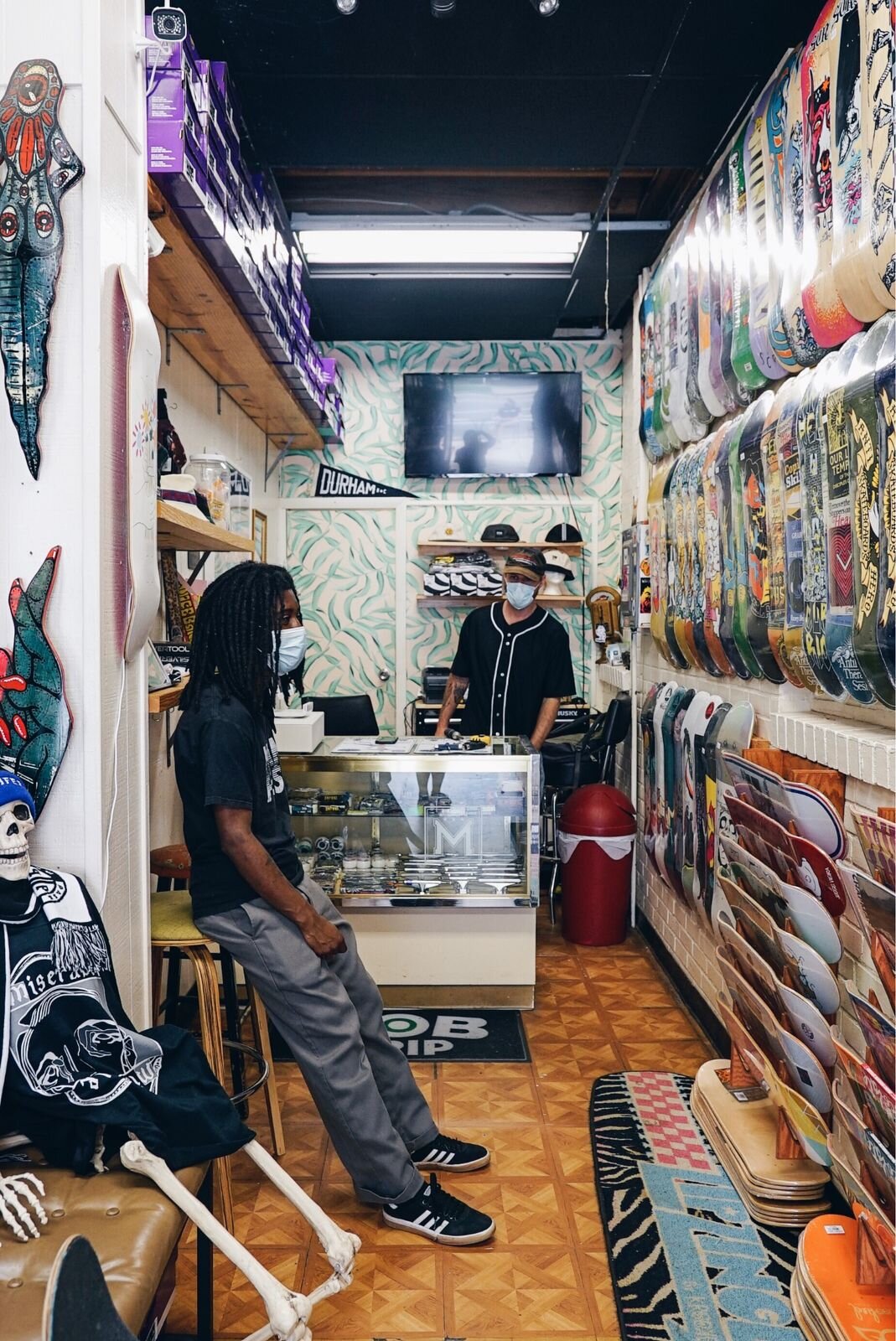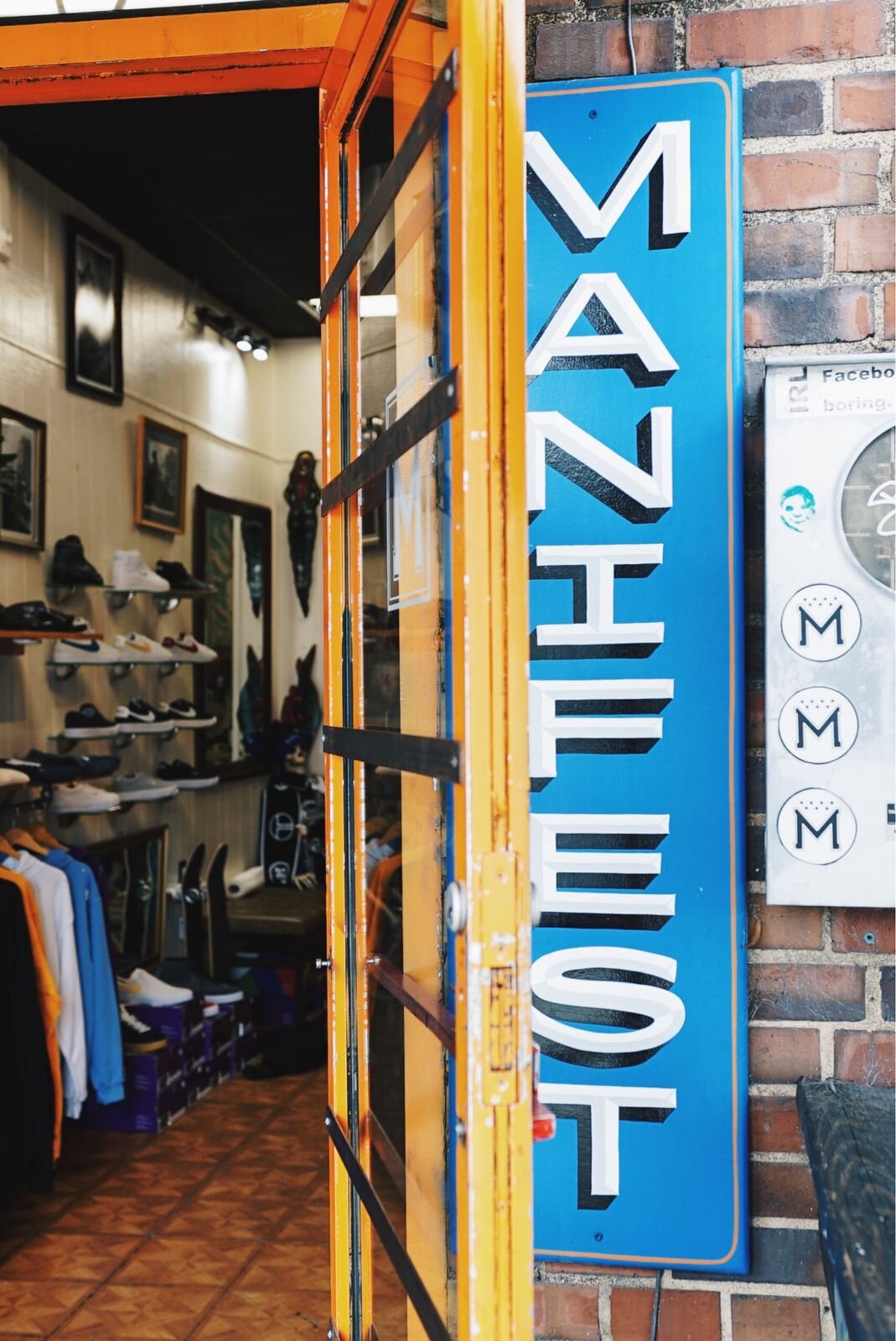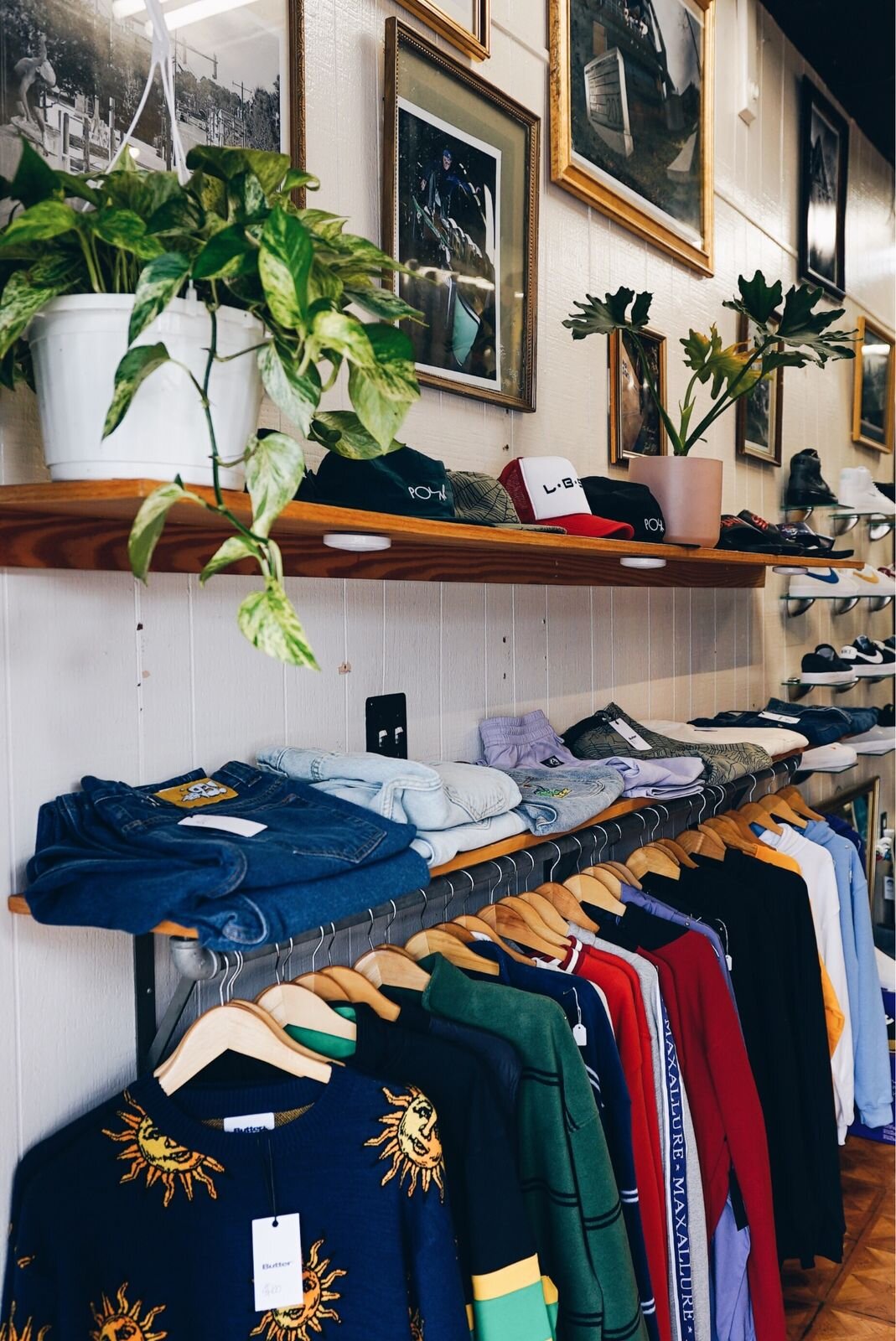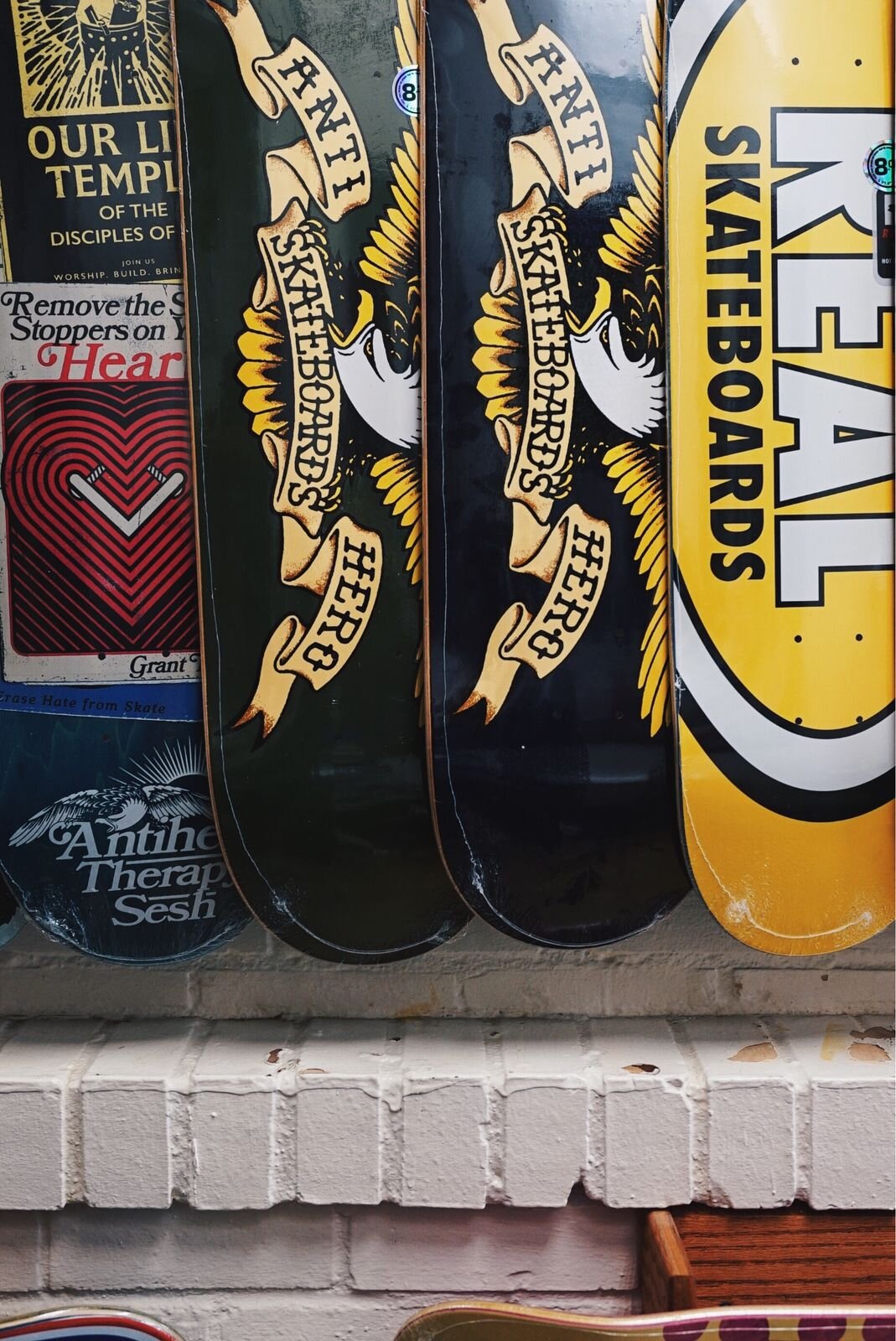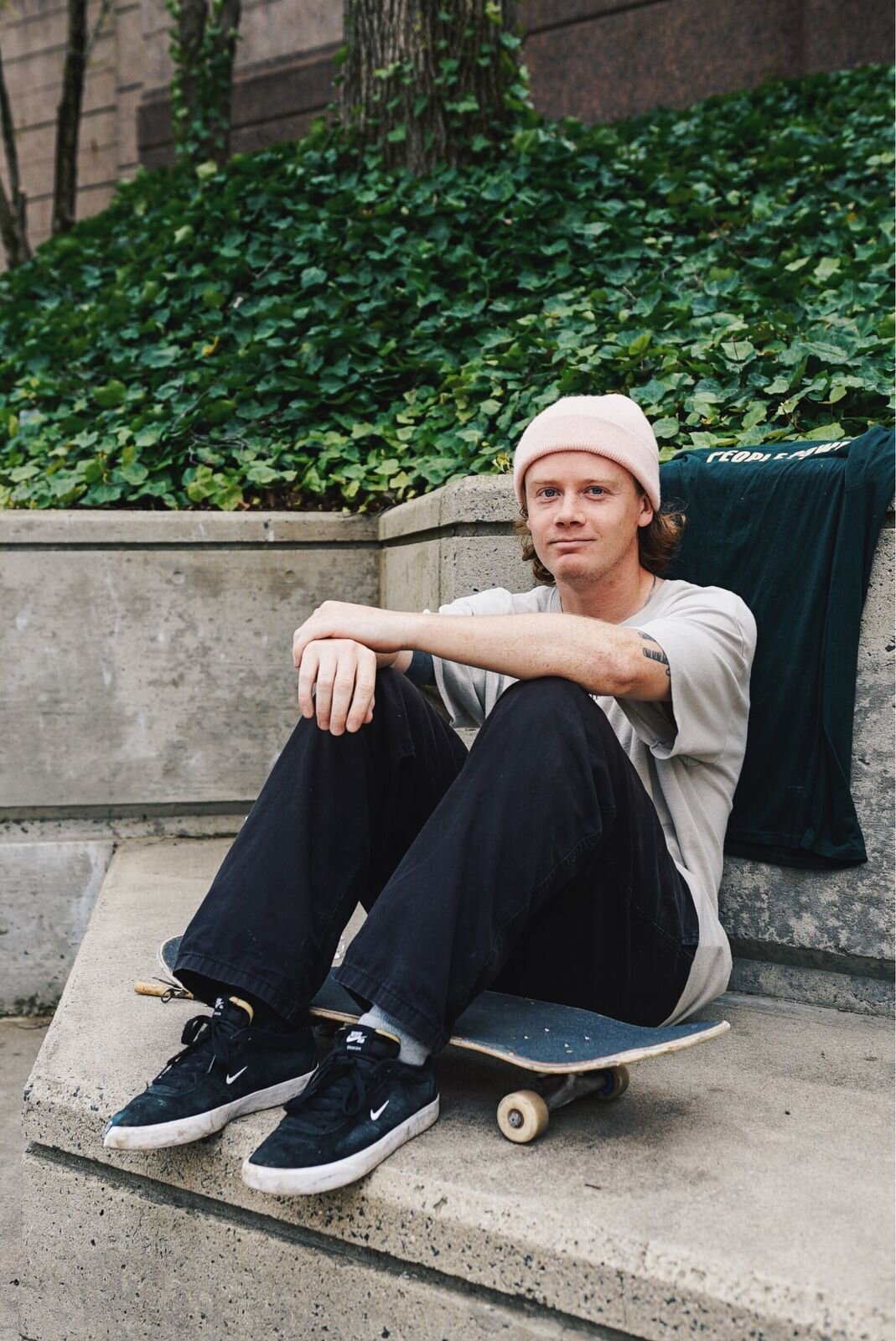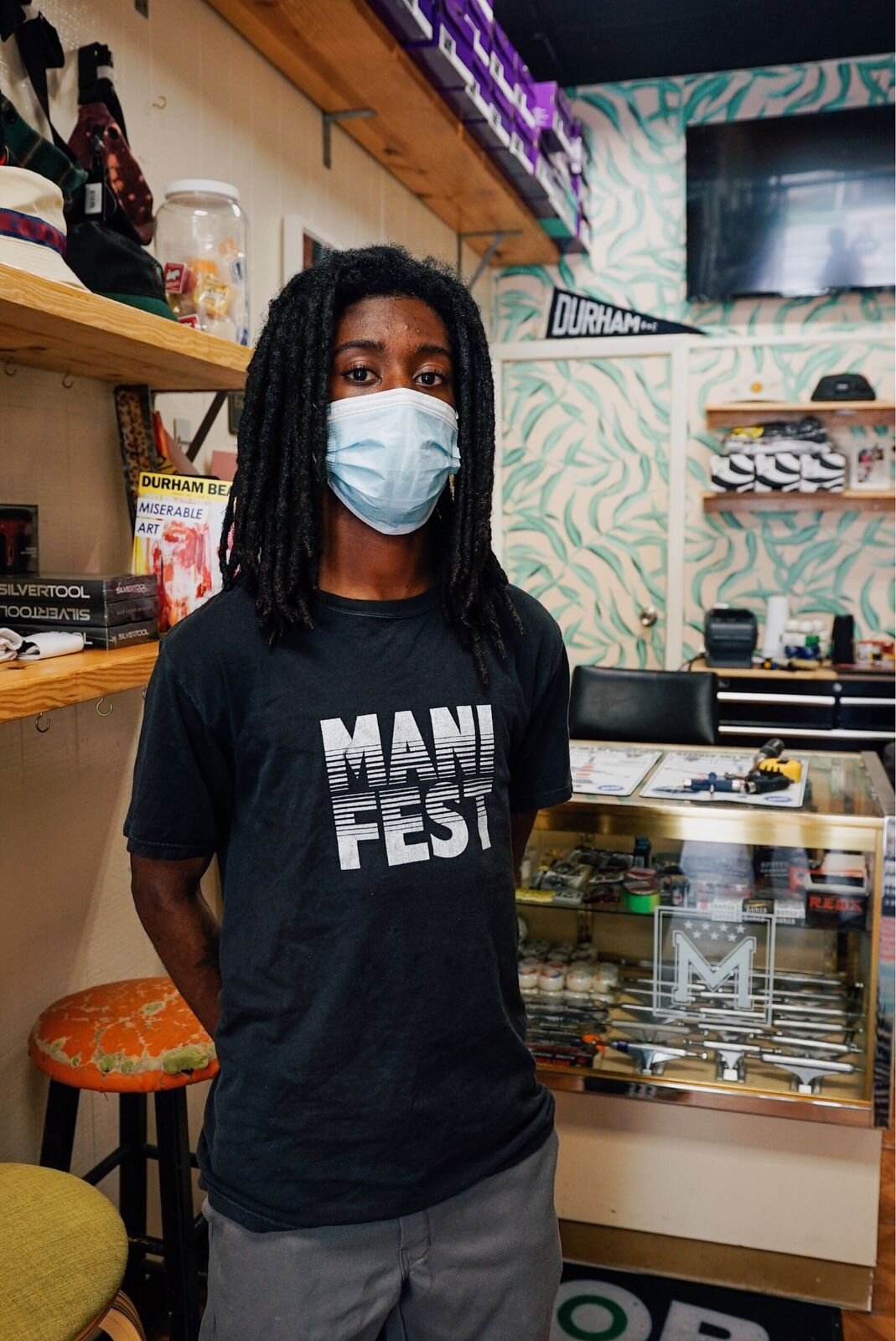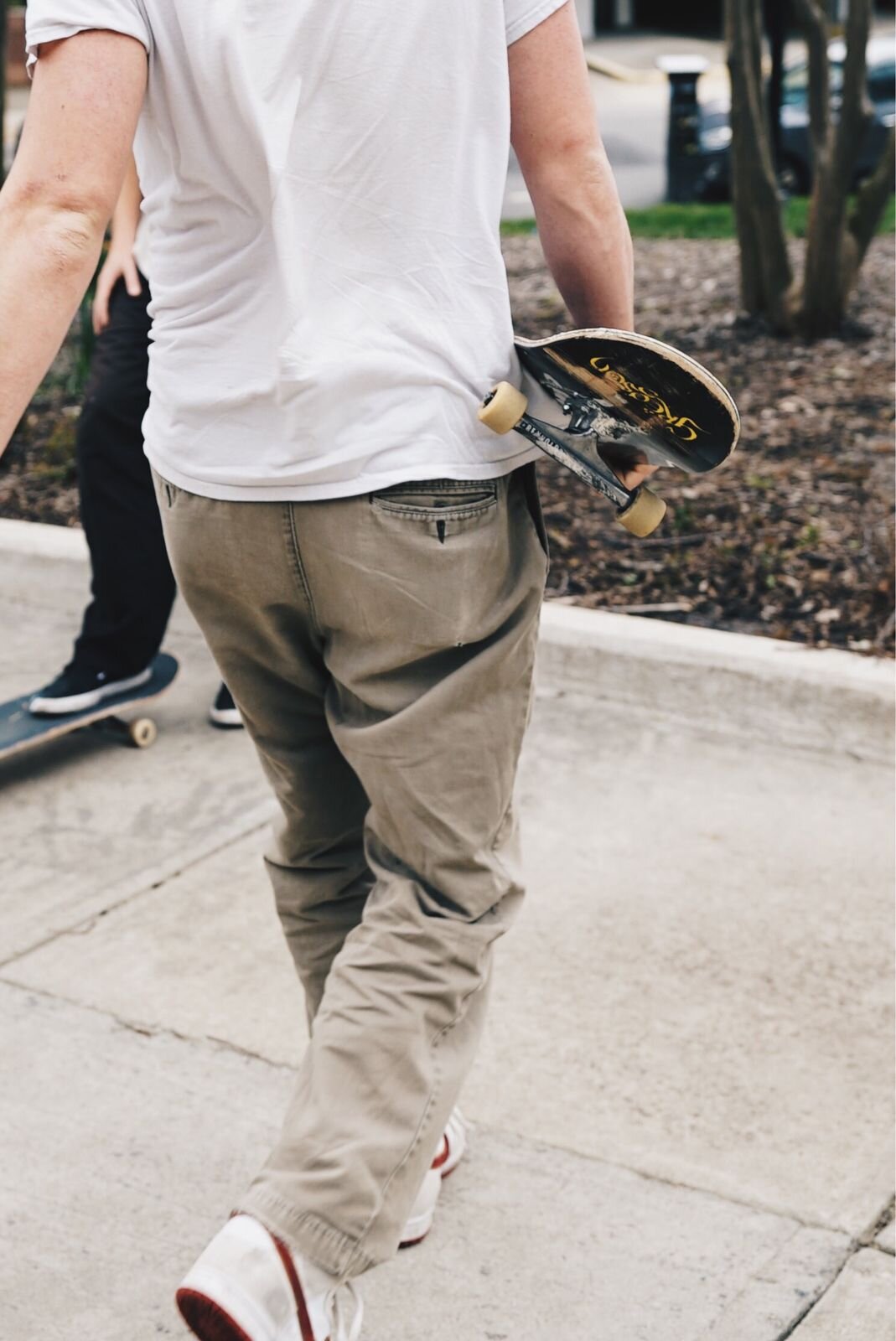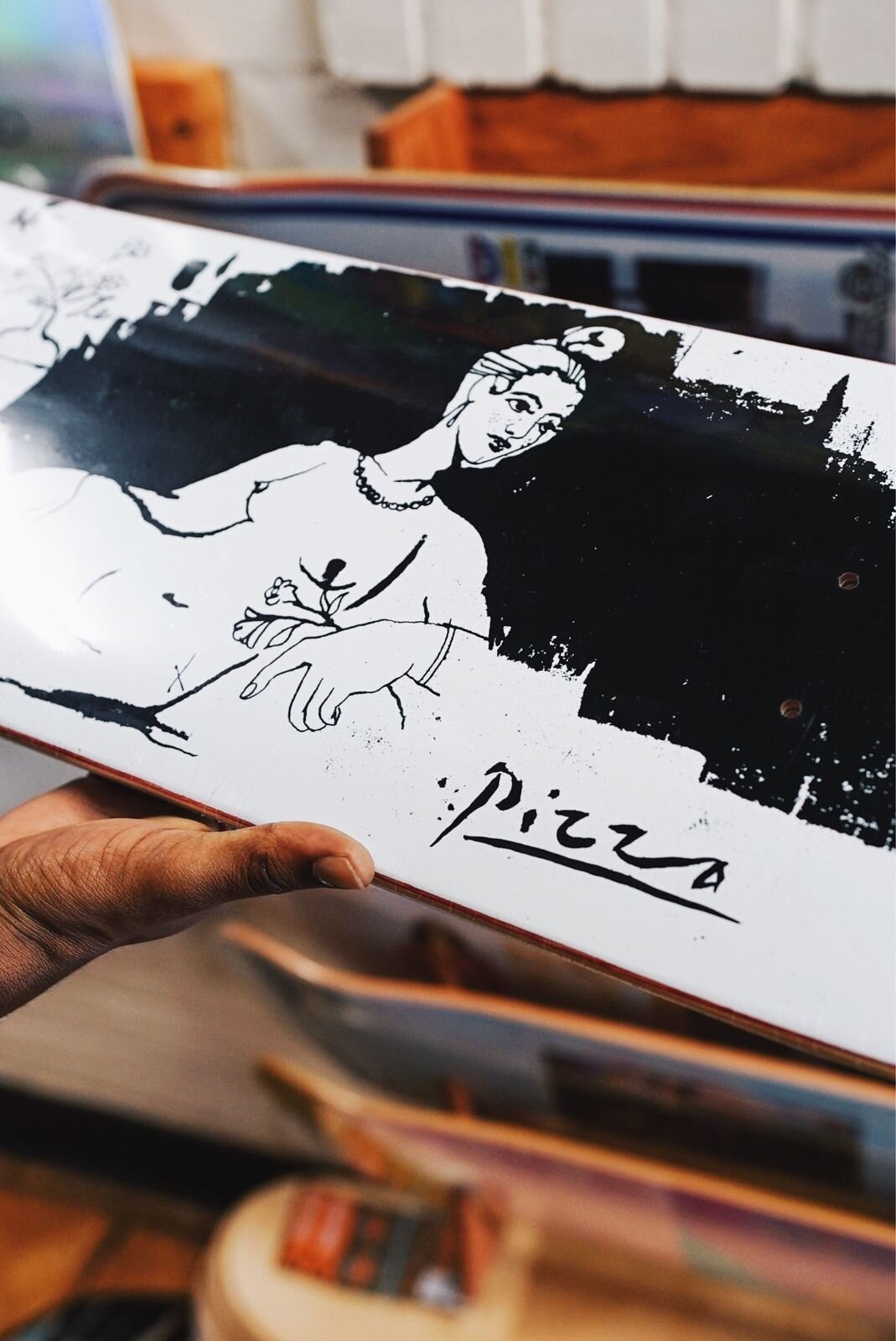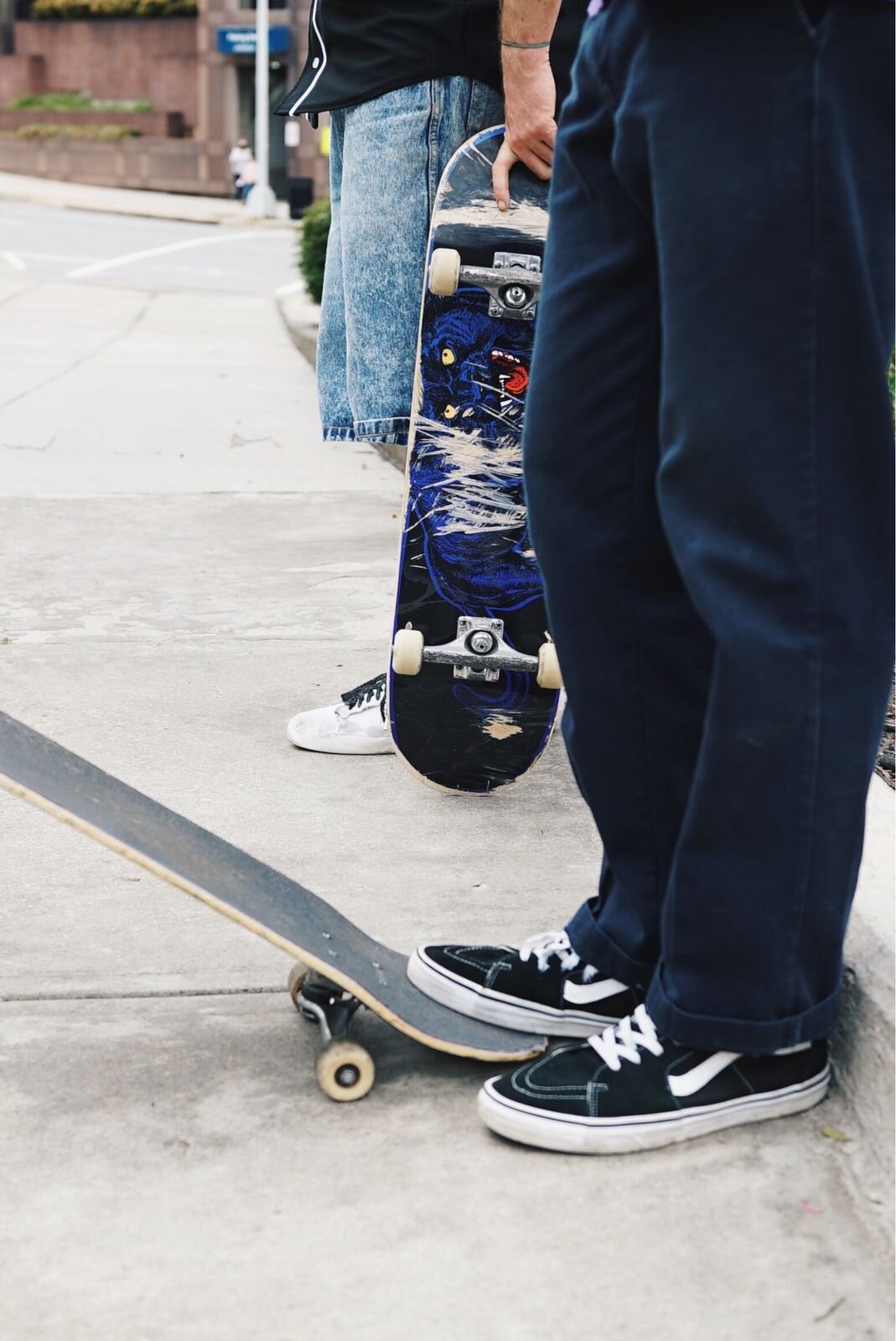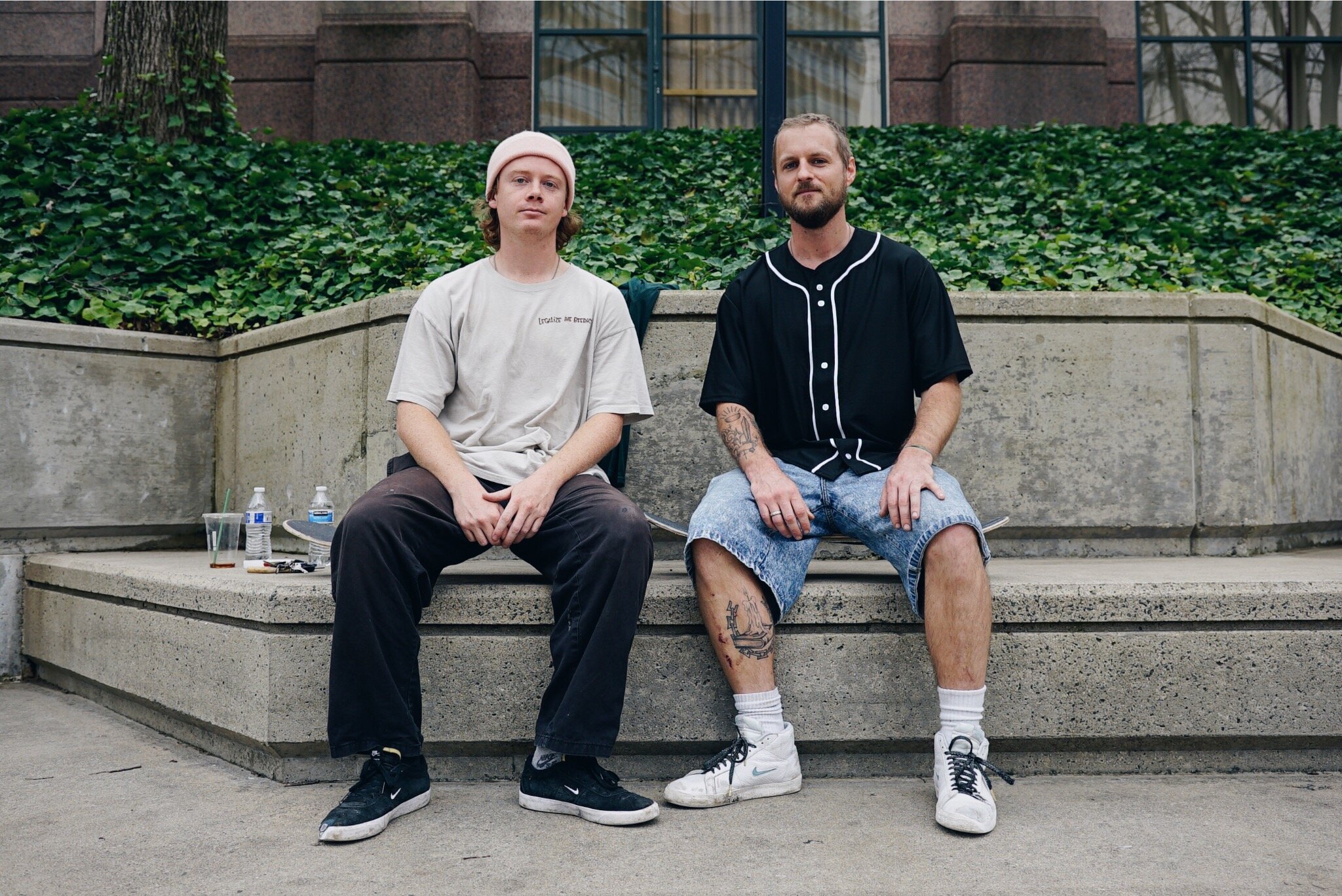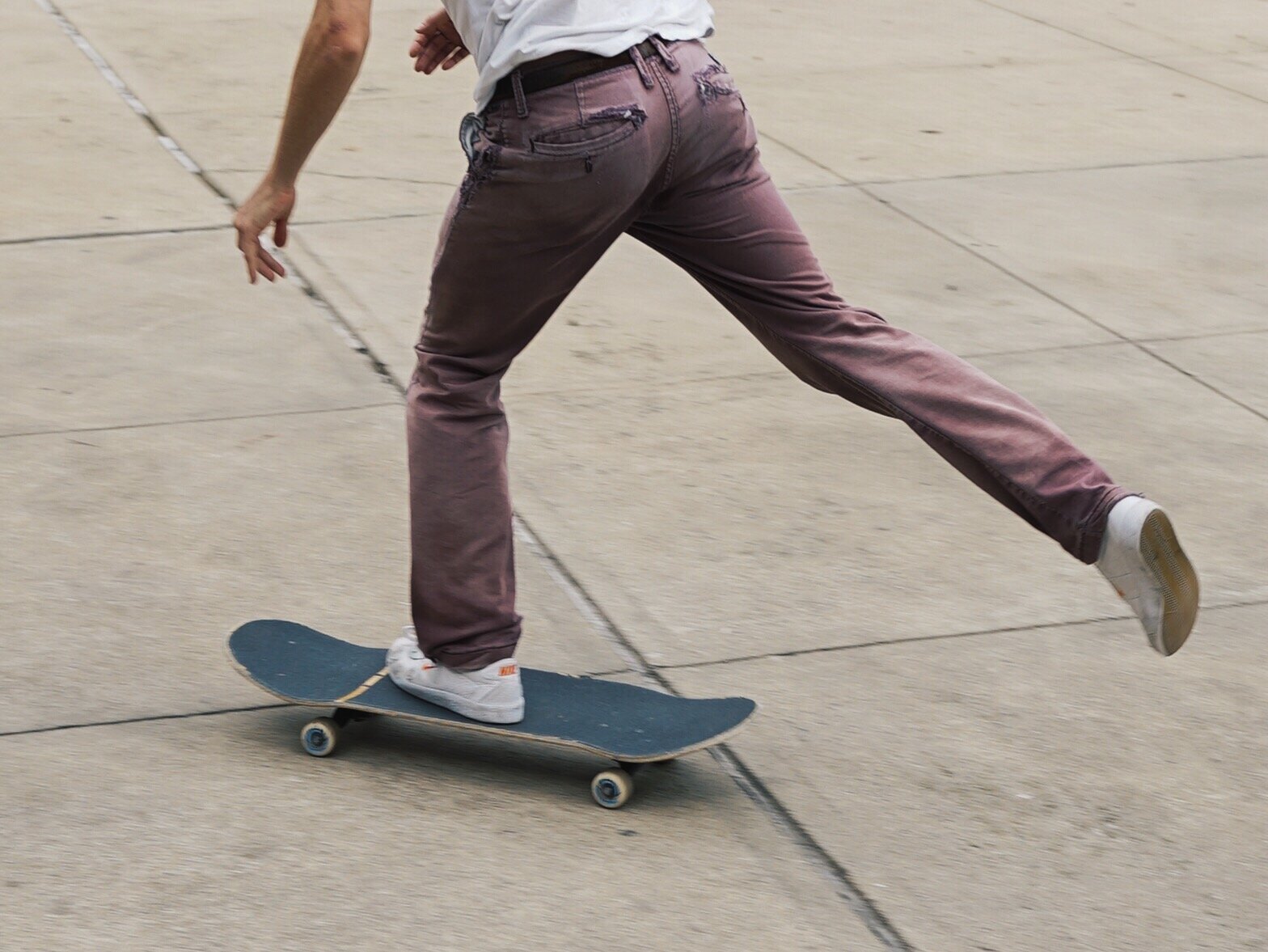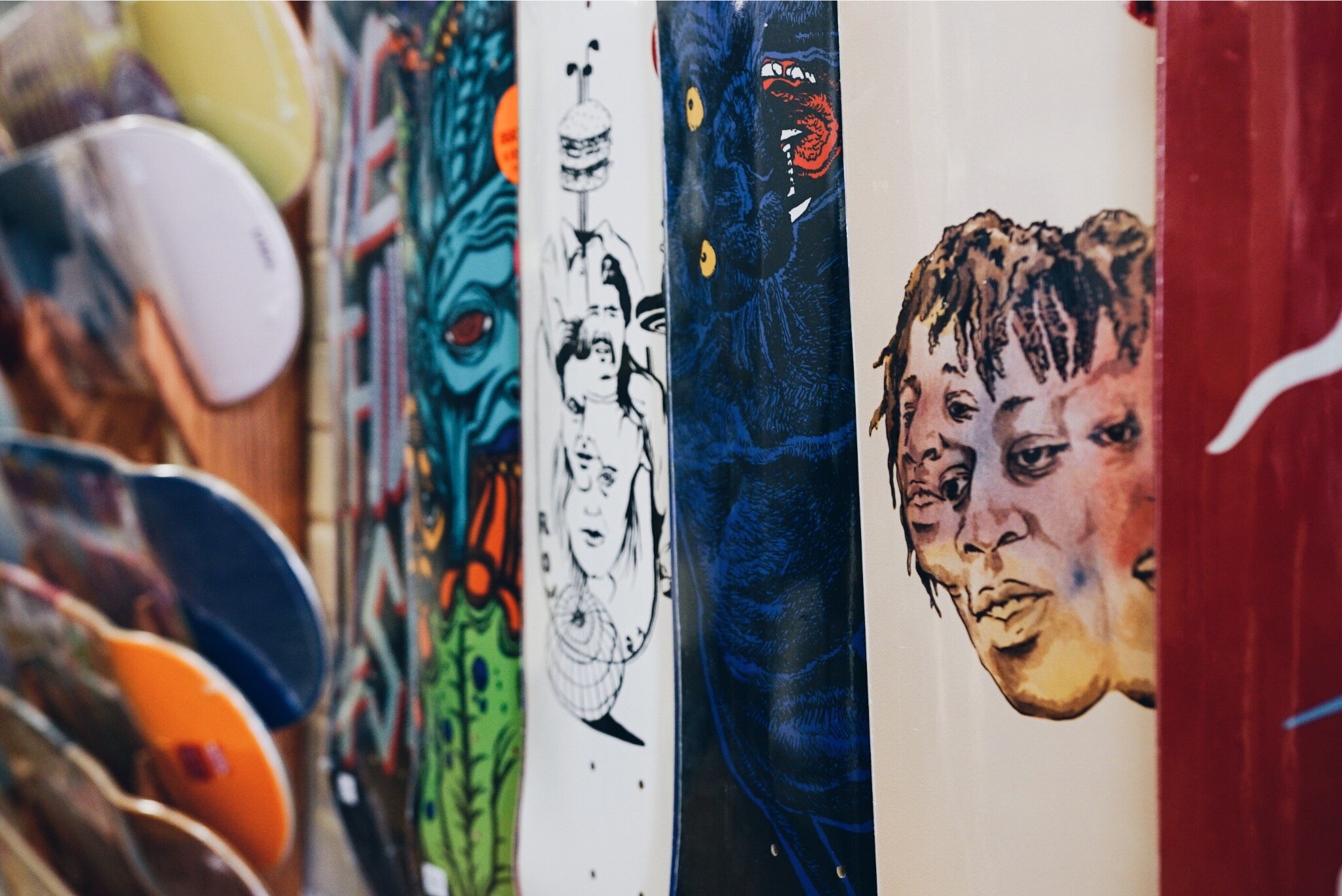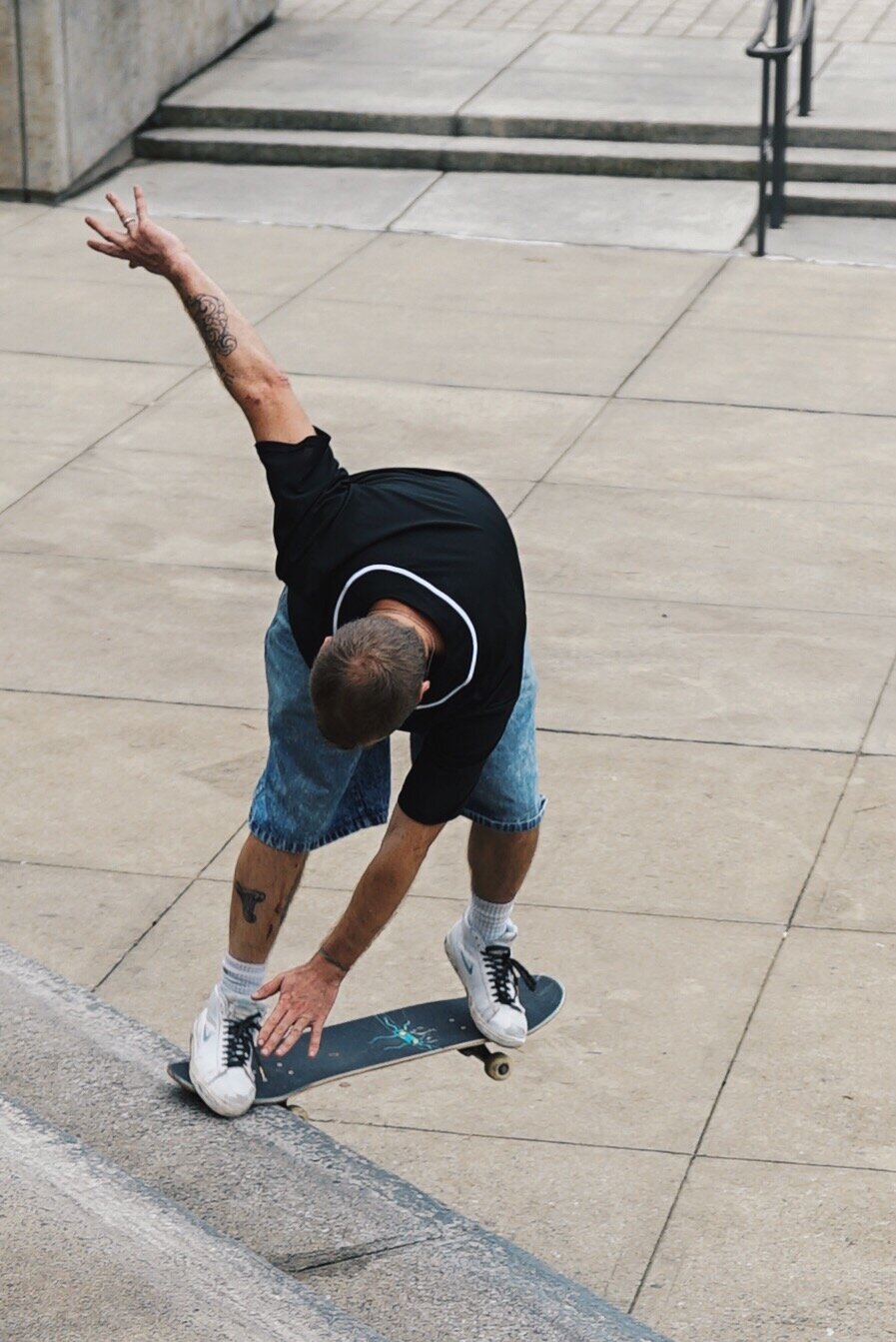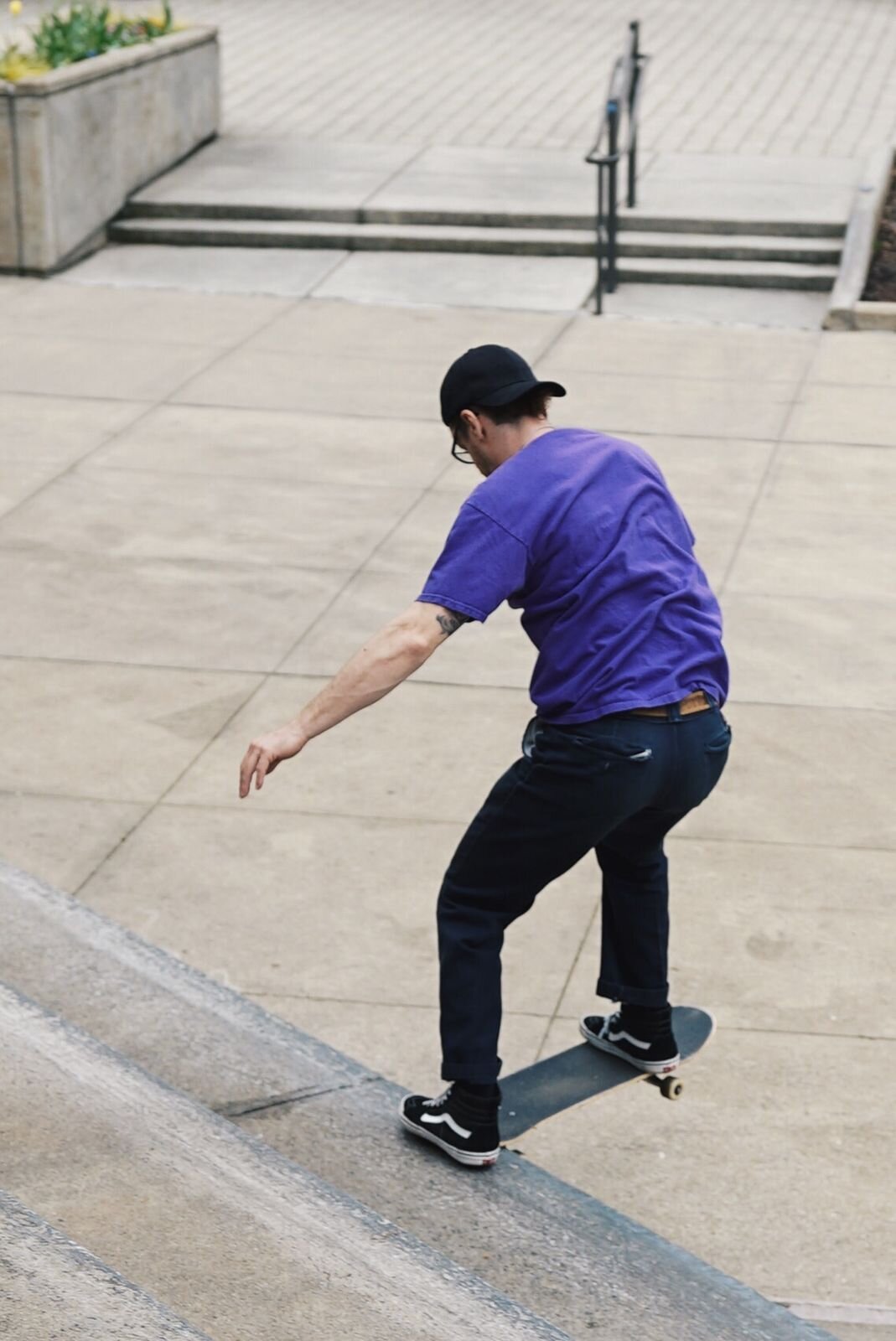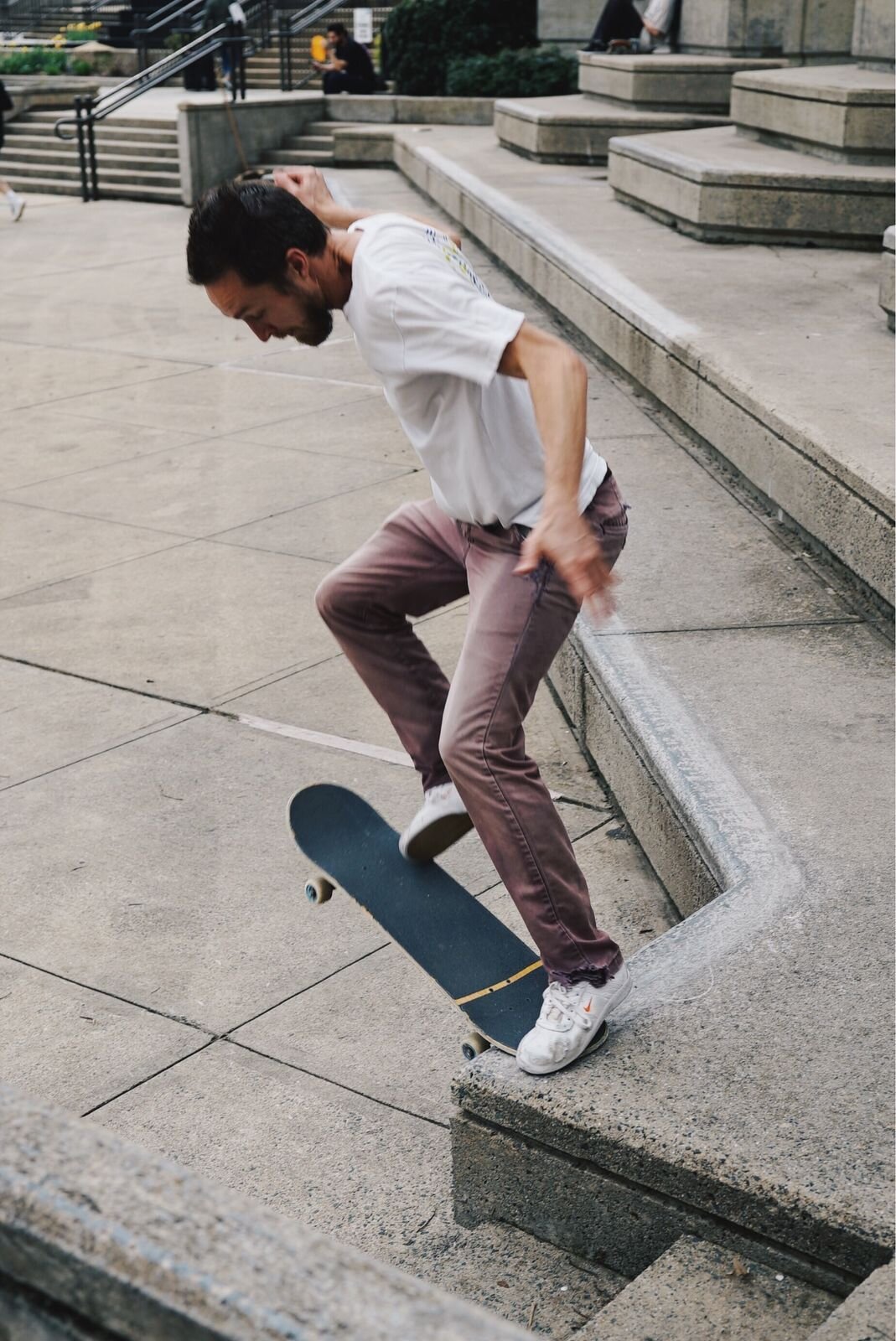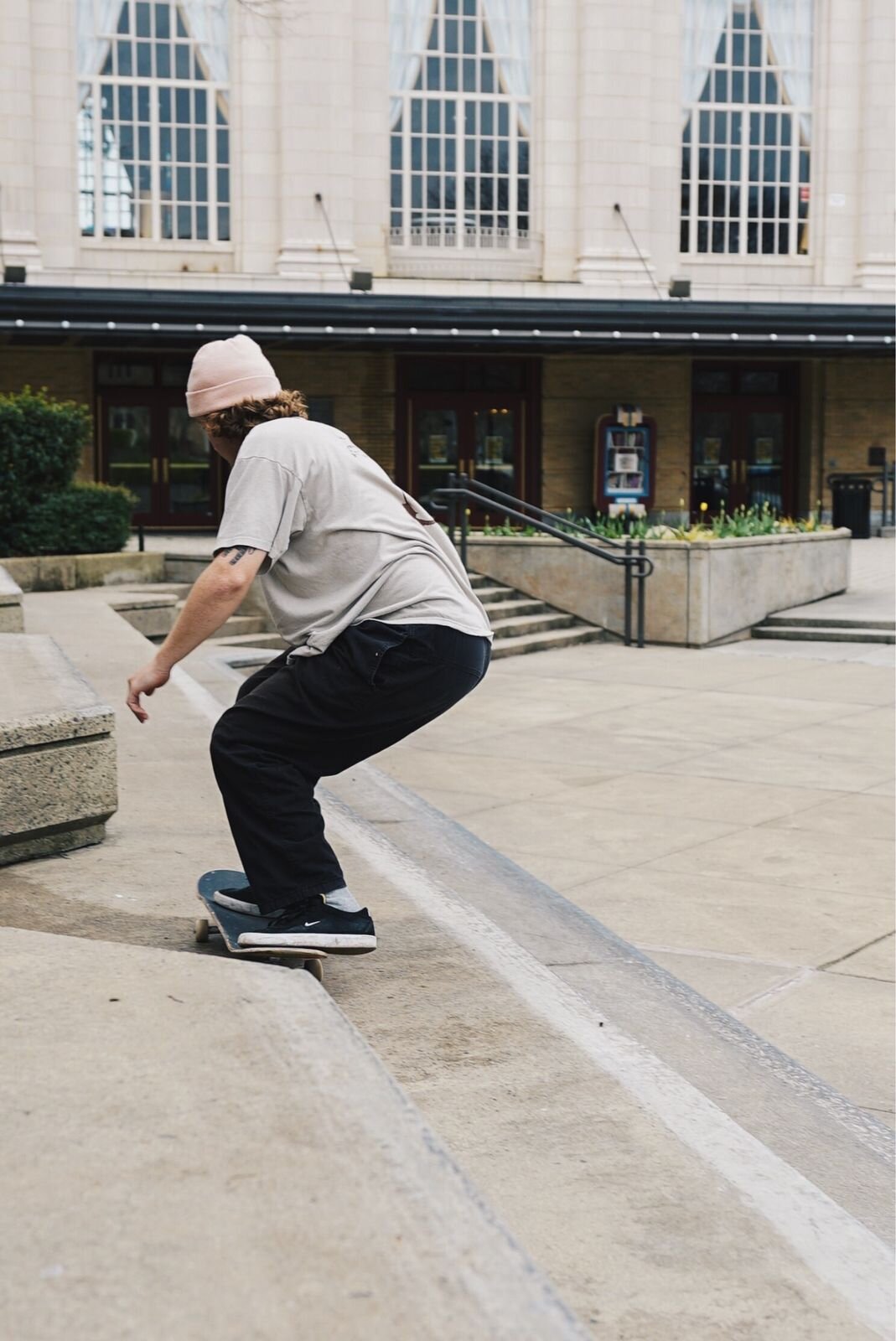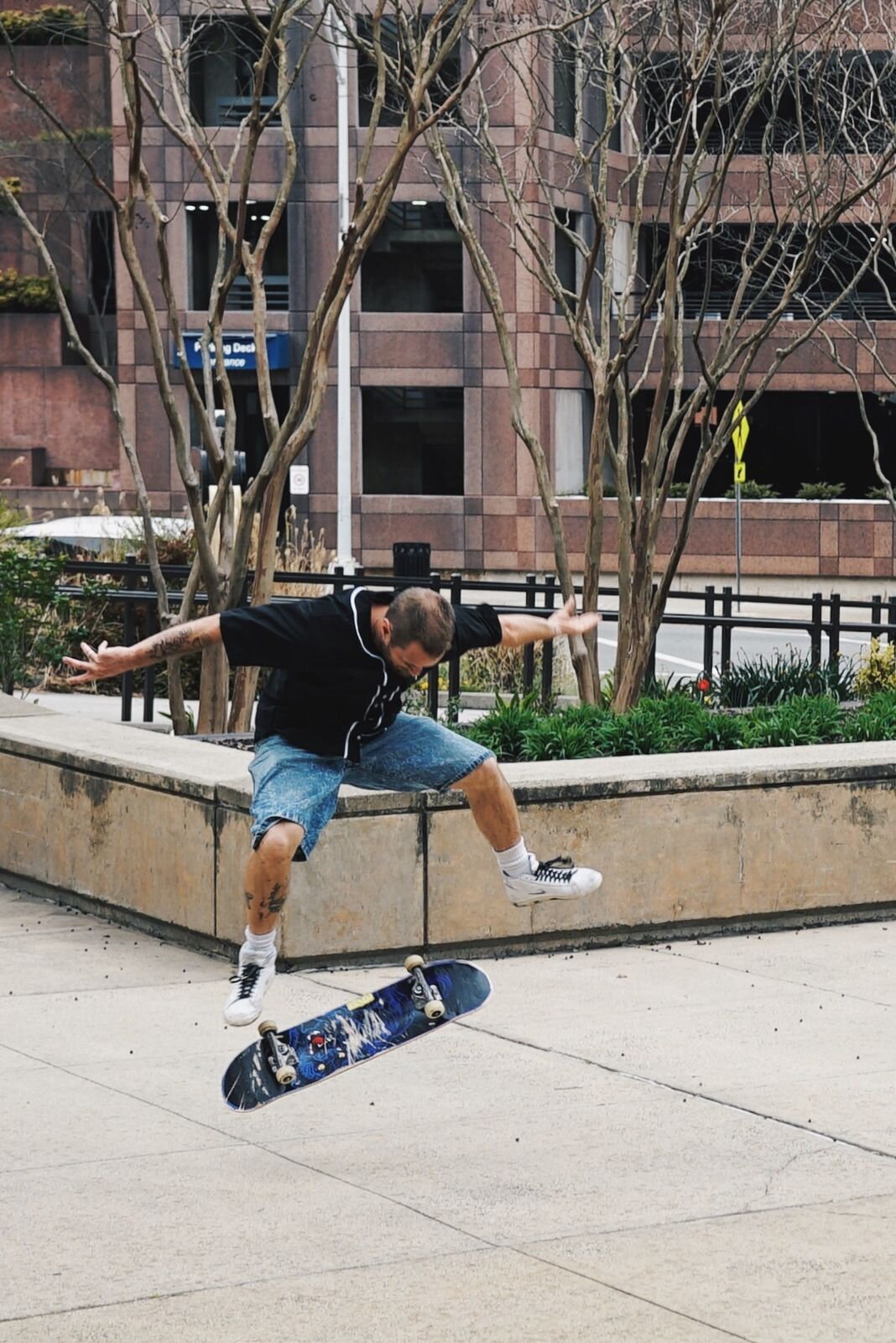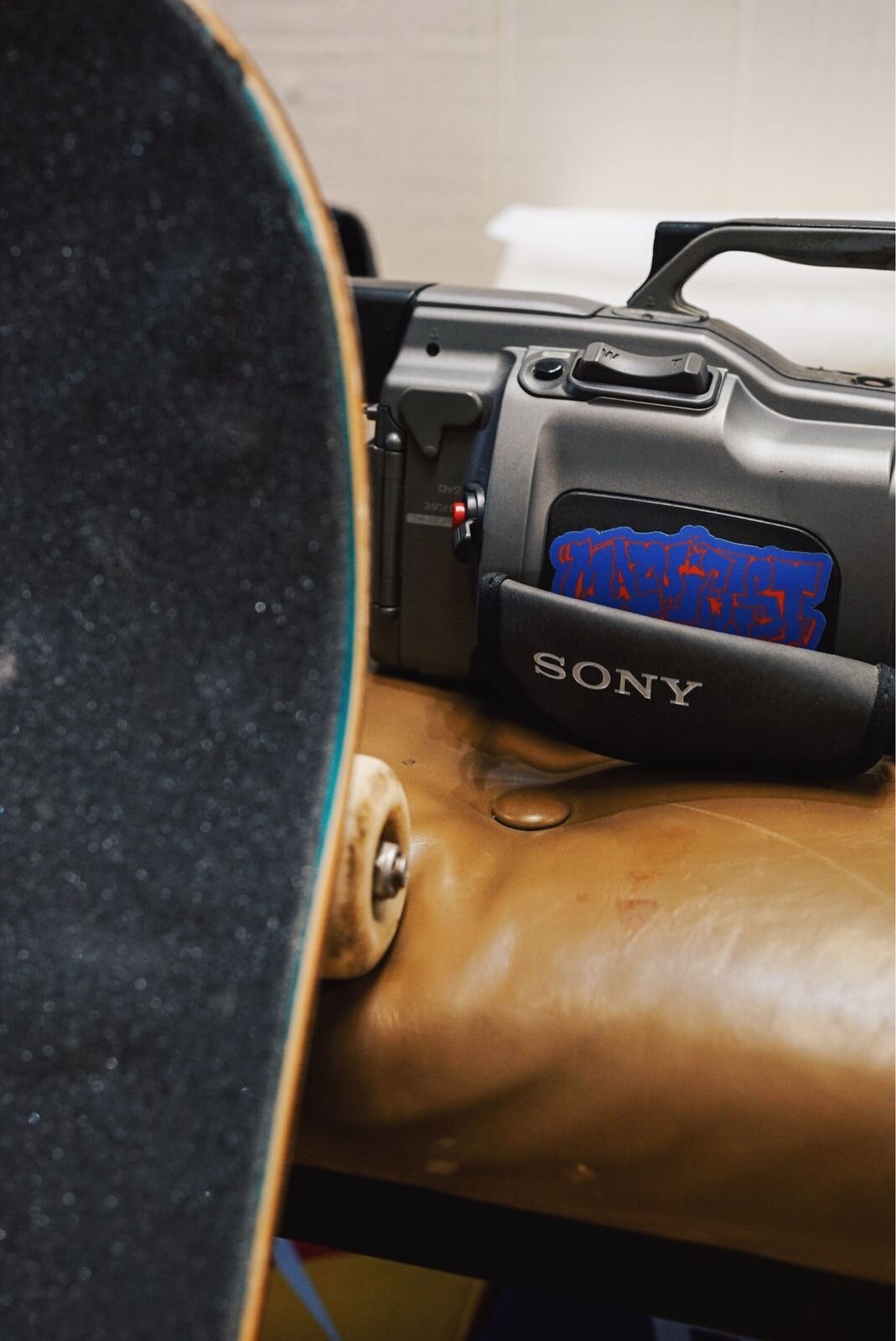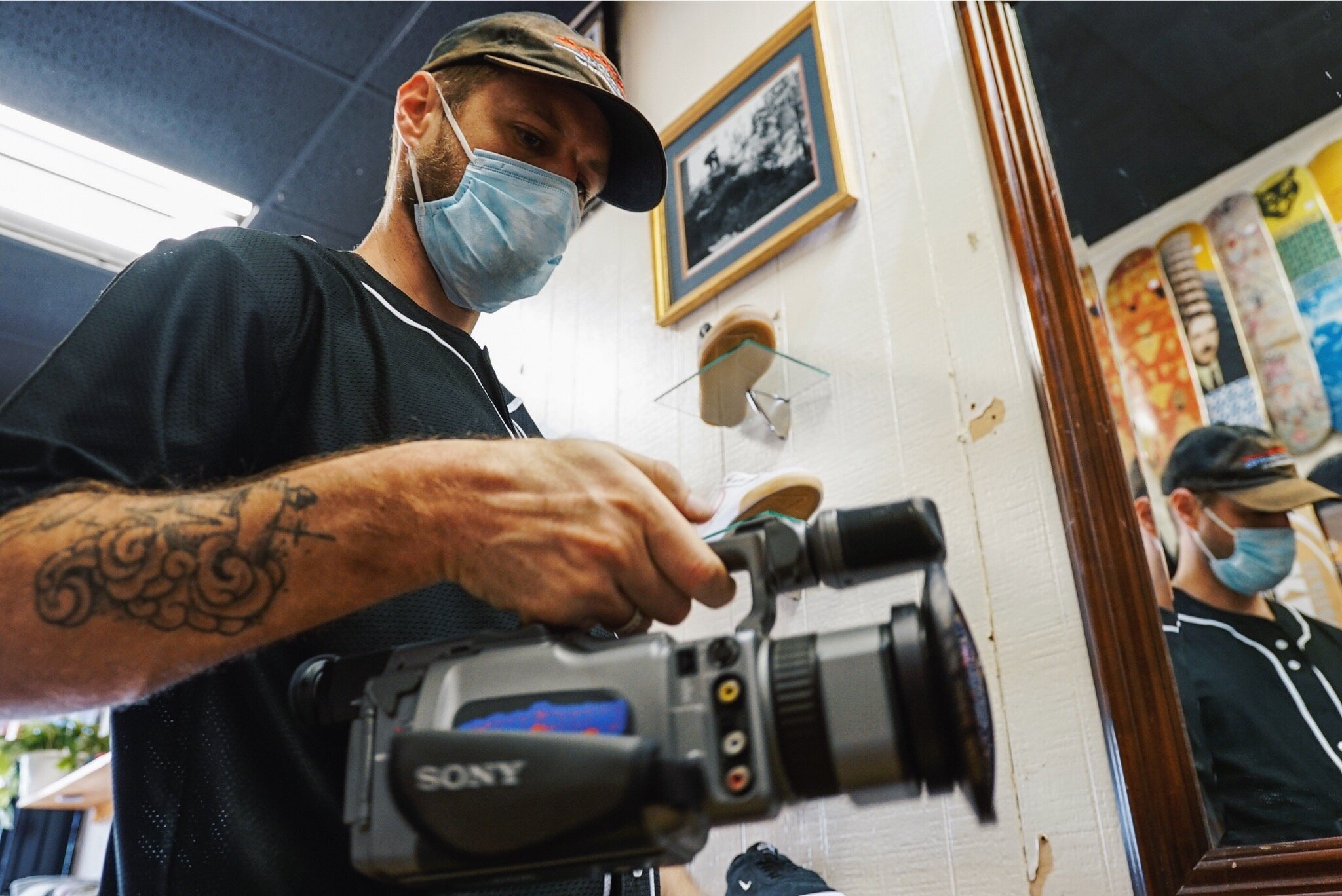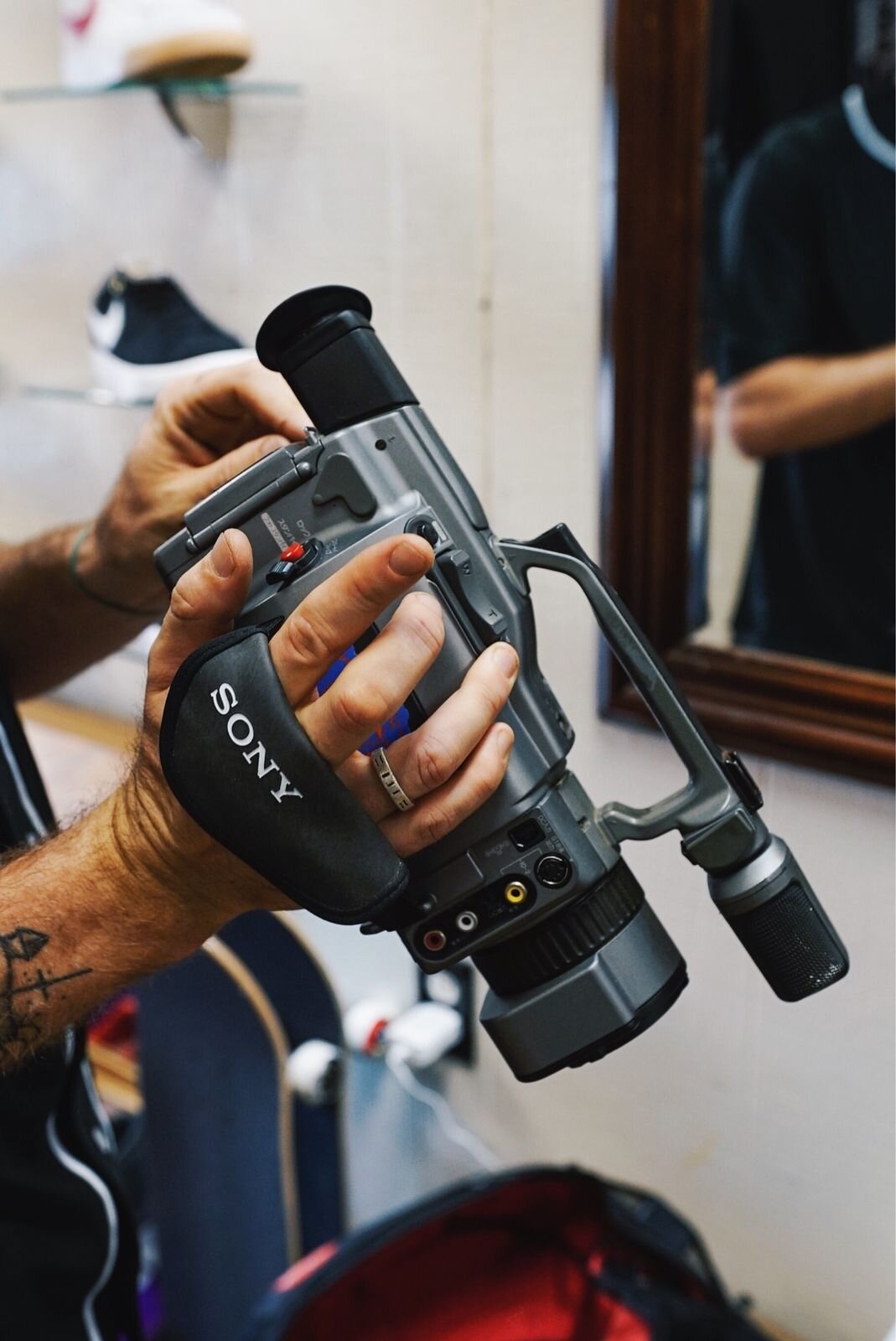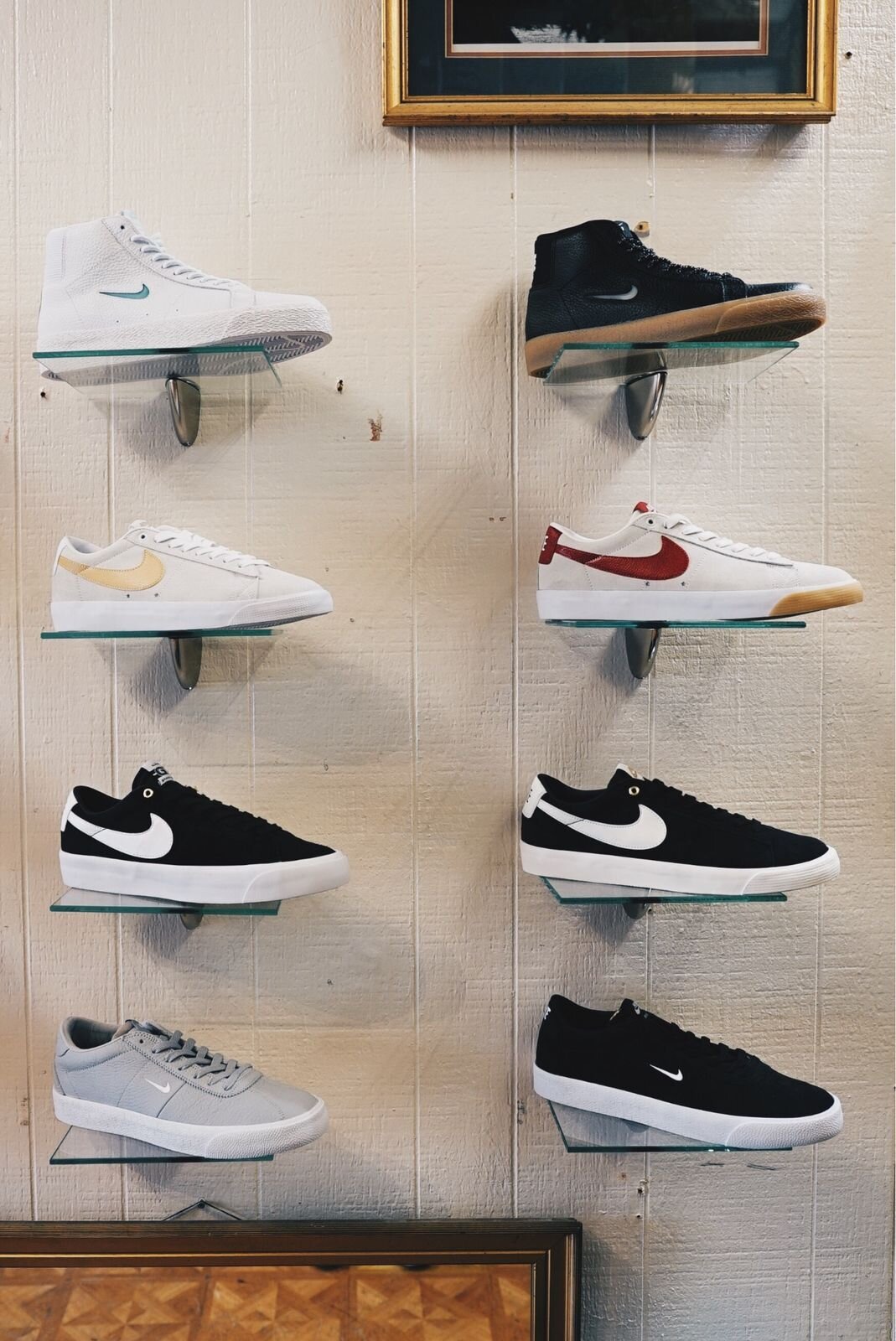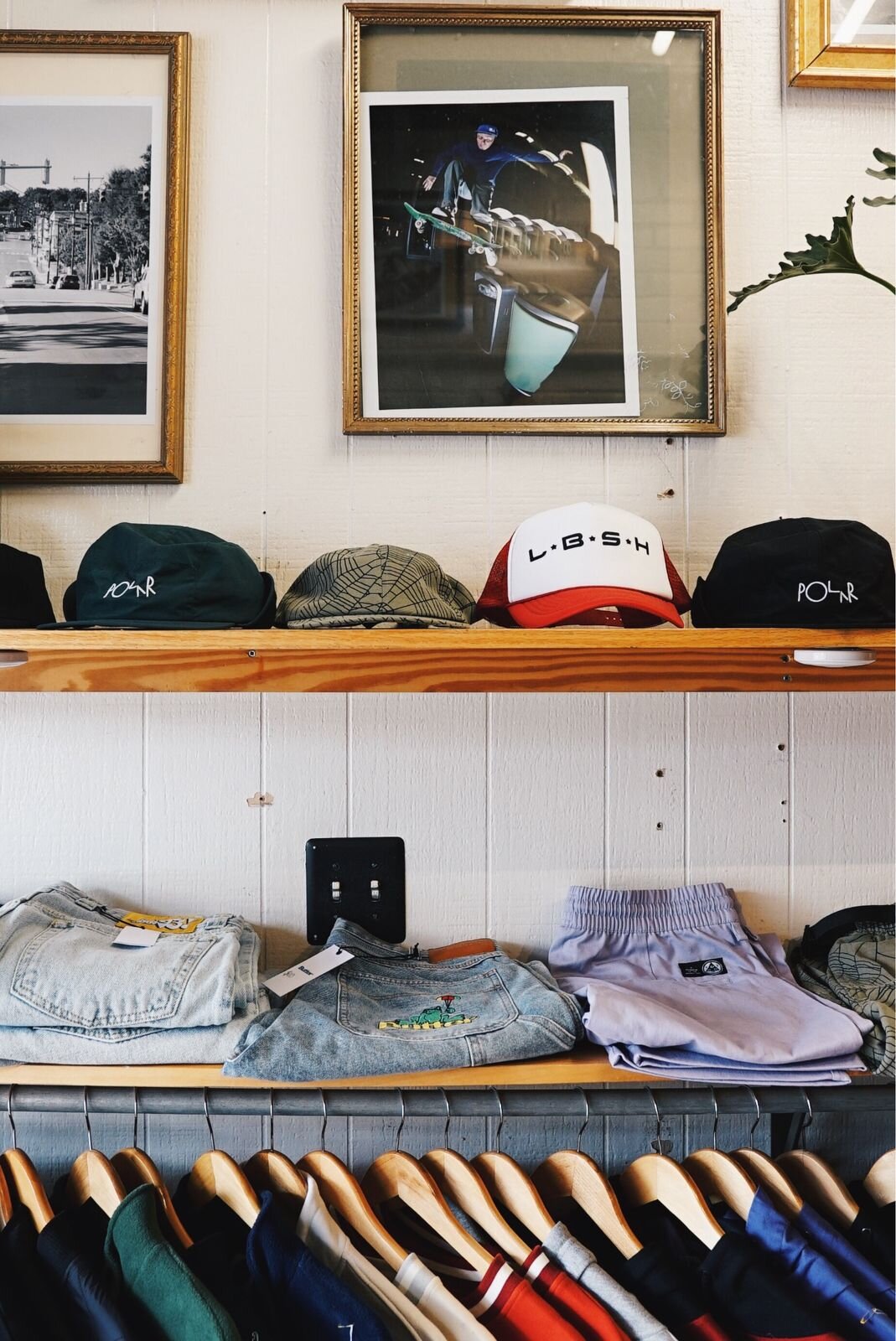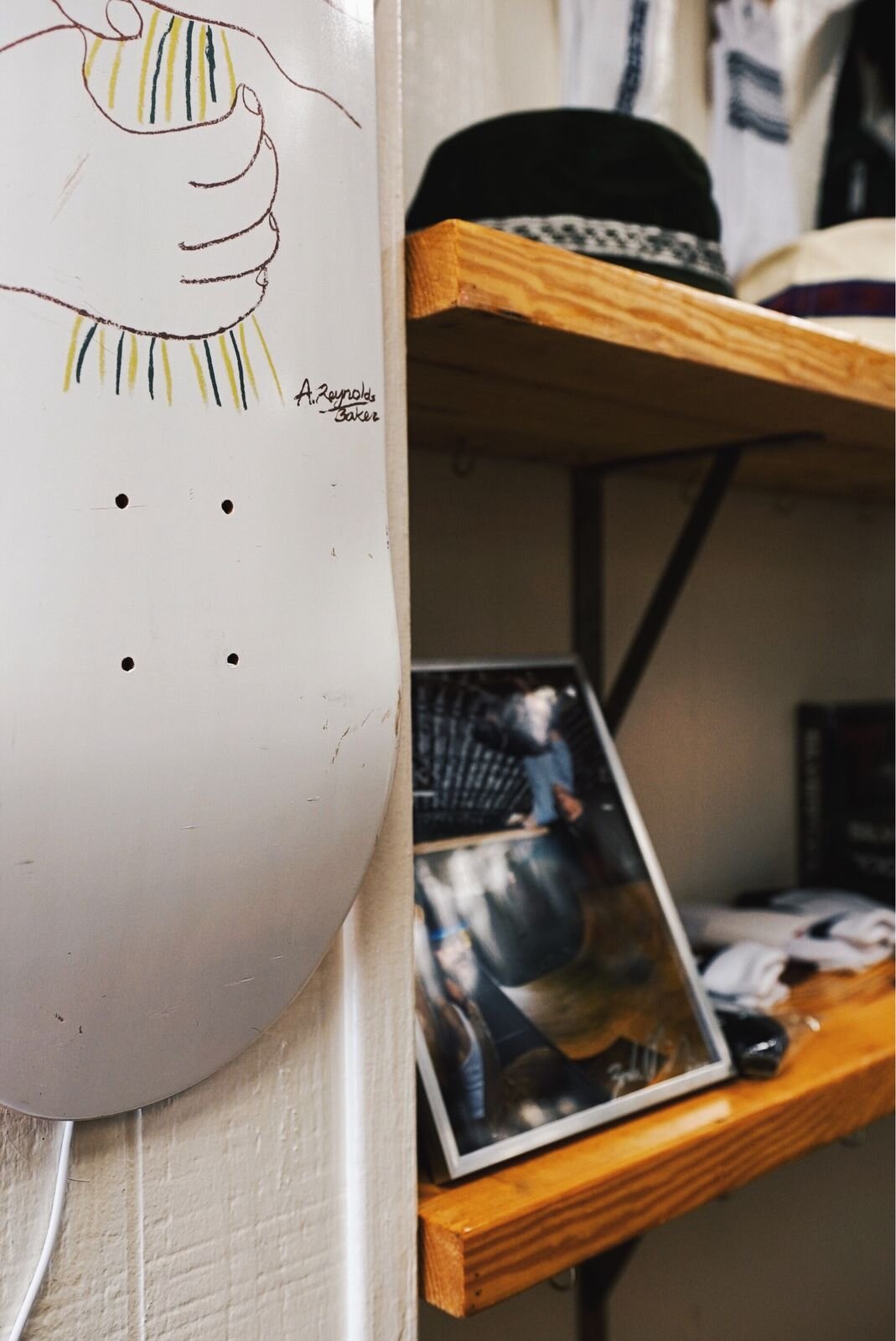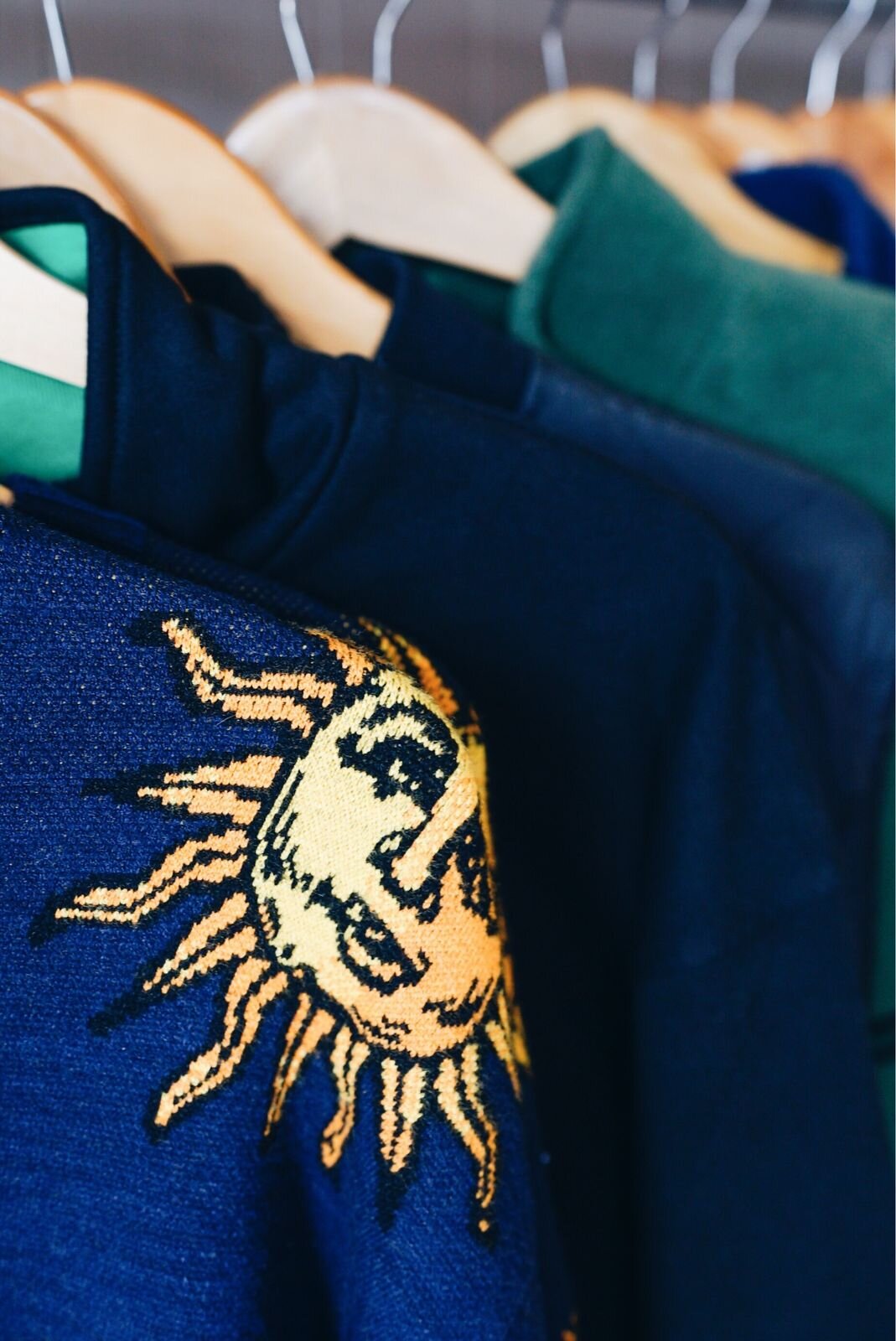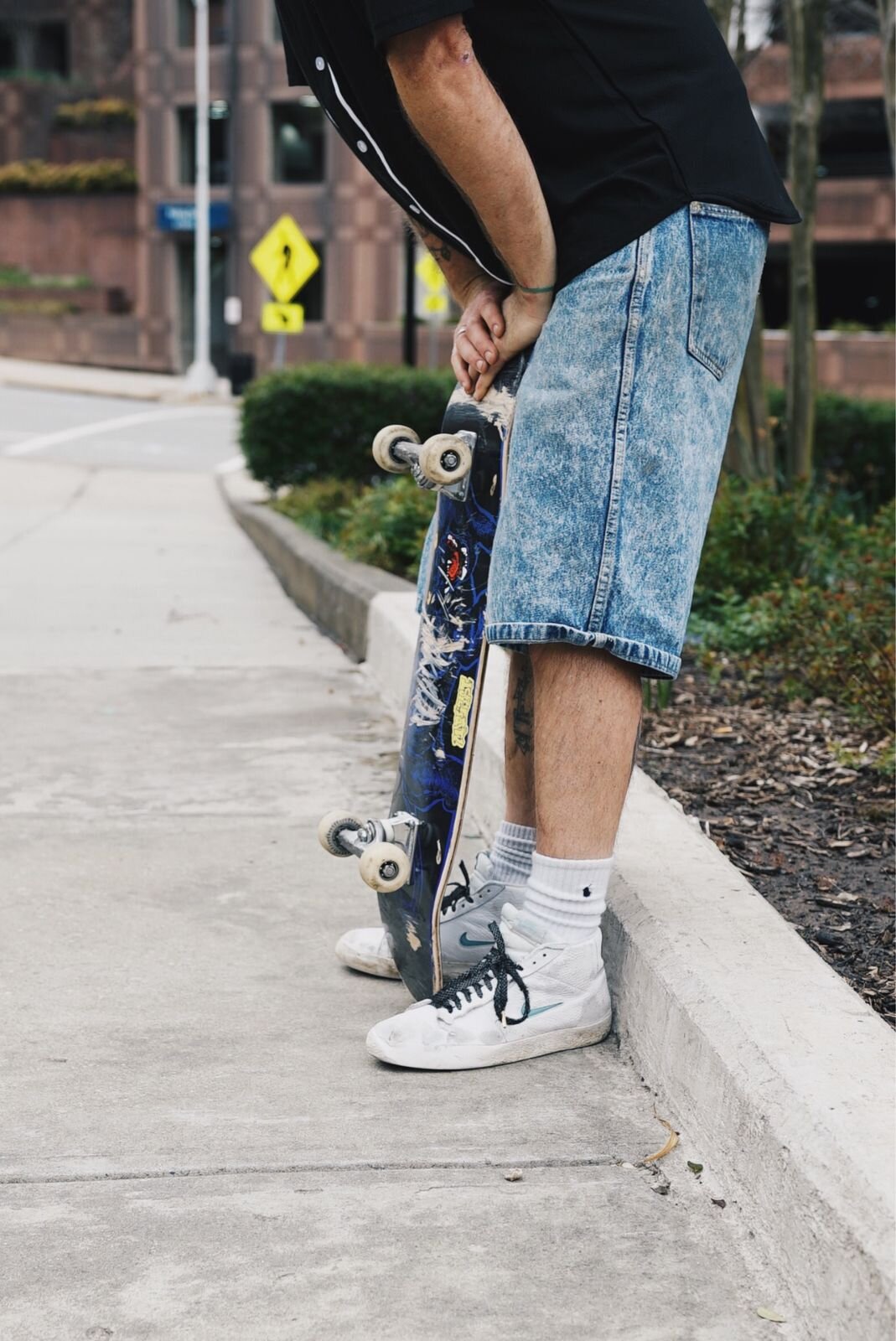Manifest Skate Shop

Mike Johnston is the owner of Manifest Skate Shop, a local skate shop located in Old West Durham. At the age of 33, Johnston has been living in Durham since he was born. FORM sat down with him about his life as a skateboarder, his journey of bringing his skate shop to life, and how the Durham skate community is becoming more inclusive. As the Manifest website states, “skateboarding is for everyone.”
Megan Zheng: How did you begin skateboarding? What does skating mean to you and how has it influenced your life?
Mike Johnston: I started skating when I was in eighth grade. I was 12 or 13 years old, and a friend of mine brought his skateboard over and showed it to me. I started skating on his board. And after a little bit of that, I had to get my own skateboard, because I was getting really into it, and I would go to his garage and borrow his skateboard all the time and skate it more than he would actually use it. I've been skating now for around 20 years, and it's influenced my life in too many ways to count. It's a big part of my life, my mental health. There's a spiritual aspect to it for me. When you're skating, you're taking an idea in your mind and making it a reality. That's sort of where I got the name for Manifest Skate Shop. I was reading a lot of metaphysical, spiritual books, and that word kept popping up—taking things that you think and feel and being able to create them physically in the world. That's the spiritual aspect of skateboarding.
Mindy Wu: How did the shop begin?
MJ: I was living in Virginia. I'm also a nurse, and I had started to do travel nursing, and I got my first job back in Durham at Duke to stay here for just a couple months. Coming back here and skating in Durham, I recognized a need and potential for a skate shop. There had been a couple other skate shops in Durham that had gone out of business, and the last one had gone out of business maybe a year or two before I got back to Durham, so there was no skate shop in Durham. There was another store here that was a consignment clothing and sneaker boutique called Culture. I met the owner, Alex, and asked him if he’d be interested in splitting his space with me. We split the space for a while, and it went well for a couple years. Eventually, Alex moved on. He took his business elsewhere, so I have the spot on Broad Street now. There were also some worries about if the Durham scene was big enough to support a skate shop. There have been other shops that have tried and failed, but I just had a sense that it would work. And I had seen where other shops maybe went wrong. When I lived in Virginia, a friend of mine owned a skate shop, and I got to see how he did things, so I had a lot of advantages of seeing someone run a skate shop really well in a small town. Money worked out, and the Durham scene grew around the skate shop more than I could have hoped for.
MW: Why shop at a small local skate shop, rather than bigger commercial stores online?
MJ: A real local skate shop is going to be staffed by someone who actually skates. You're going to get expert advice and guidance if you're new to skateboarding, whereas if you go to a place at the mall, you're not always going to be dealing with a skateboarder who knows what they're talking about. Good local skate shops also give back to their scene. When you support a local skate shop, you're supporting your local skate scene. We have products from small, independently-owned skate companies that are really starting to take over the industry, whereas there used to be several huge skate companies or distribution companies that own some smaller brands. There are a lot of independent skate companies now that, even more regional ones, feature local skaters and things like that.
MW: Could you talk about the history of Durham skate culture?
MJ: From my experience, there's always been somewhat of a Durham skate community. It started out relatively small, though. For me, growing up, the skate shops and the skateparks were in Raleigh. There were a couple indoor parks in Raleigh, such as Endless Grind and Vertical Urge. A lot of the people who were filming skateboarding and putting it out on the internet were also based in Raleigh. In Durham, there was a smaller crew of people that are around my age. I worked at Wheels for my first job, and that's how I met a couple of the local Durham skateboarders. Wheels actually built a skatepark around that time. One of the cool things that got the Durham scene to grow was the first Durham skate shop called Ujamaa Boardhouse, run by this guy named Nick Spaulding. While Ujamaa was still around, Durham built the Durham skatepark that's in Durham Central Park. Having the skatepark was one of the biggest things—skateboarders are gonna start meeting each other and networking.
Street skating has always been a big thing in Durham. There are a couple famous skate spots in Durham that have since been demolished. Durham's always been part of the Triangle scene, but as second place to Raleigh, so between the skate shop and having a skatepark for a long time, the Durham scene is growing, and more people from Raleigh are coming to skate in Durham. Now that Durham has a shop, there's a unity between Durham-Raleigh scenes. The Durham scene’s always been there, and it's been growing. Now we're taking over.
MZ: You mentioned that a skatepark and skate shops are a huge part of growing skate culture. What do you see as other components of skate culture, or are they the predominant drivers of building a skate culture in a town or community?
MJ: The predominant one is a skateshop, especially a skateboarder-owned skateshop. Events that bring skateboarders together is probably one of the biggest things, and typically you need a skatepark for that. Durham's got all the key pieces to have a good skate community, and that's why we've seen it get bigger over the last couple years. On the other hand, there's a constant flow of skateboarding media being put out by the industry and individuals. The amount of skateboarding content that you can see in a single day is insane compared to what I could see when I was a young kid. That's also part of the growth of skateboarding influences — that it's readily available for anybody to look at online at all times. We try to put out videos, film the local skateboarders, and put ourselves out on the Internet so that locally and beyond, people can see what we have going on in Durham. Whenever we go out and skate, we have a camera with us.
MW: How do you guys go about the process of filming a trick?
MJ: Making skateboarding videos by filming tricks has been part of it for a very long time, since probably the late 80s and early 90s. That tradition has carried on. I’m one of the main filmers for us, but we have a couple people that can film. Sometimes it happens quickly, but other times, it takes a lot of tries and becomes a mental and physical battle for both the filmer and the skateboarder. If they're trying to do multiple trips in a row, the filmer needs to follow them on their skateboard, so a lot of work goes into it. The skate shop put out a video in January of last year and had a premiere for it. There were a couple hundred people there. That's what it's all about—filming the video, hosting a premiere, which is like a big skate party where you celebrate the completion of this project.
MW: When you film, do you do it with any sort of special equipment?
MJ: I have a camera that is old, and it films on tapes. It's this camera that a lot of skateboarders still use. It is pretty much only used by skateboarders, called a Sony Vx1000. Skateboarders are still using that camera because there's a lens for it — a fisheye lens — that is specifically made for this camera. The way the footage looks in the standard definition, the lens that goes to it, the microphone, the sound quality from this microphone that was made—there's this whole culture around this one Sony video camera in skateboarding. Eventually the Sony the Vx000 is going to be extinct, but we all have phones now that you can film with, and that's been a big thing in skateboarding with people filming with their phone and putting it on Instagram. People used to film these full length videos, and now it's a lot more of, “let me film this trick real quick” and put it up on Instagram. The culture has changed a little bit. Some say for better, for worse. There's still something special about a full length video, and companies still make them.
MZ: Recently a lot of skate clothes and skate brands that are core to skate culture have been bleeding more into popular style. How do you see skate style influencing current style trends and popular culture?
MJ: I think skating has had an influence on general style for a long time, and I think that it is more prevalent now than it used to be. The thing now that I feel like is kind of came back into skating and is also permeating into other fashion areas is baggy is way back in now. People went from wearing really baggy jeans in the 90s and then more form-fitting jeans in the early 2000s, and now people are back into the ultra baggy jeans. There are a lot of skate brands that push into the more artistic aspects of fashion. With their logos and styles, smaller brands work with actual artists.
MW: We were going through your website, and it says that skateboarding is for everyone. Could you go into how Manifest might be working to make skating more accessible and more inclusive?
MJ: Skating hasn't always been an inclusive activity. There's been historically a lot of “this is for skateboarders. Everybody else can stay out.” If you didn't look a certain way or dress a certain way or even think and speak a certain way, it was like you weren't a cool skateboarder. There's a bit of gatekeeping in the skate community. Over time, especially in the last couple years, skating is starting to transform to be a lot more open. Personally, I'm trying to make that a focus of Manifest and a focus of the Durham skate scene. I believe we're all part of the same thing and have access to the same loving core and soul. I want my business and my favorite activity to reflect that. Especially over the last year, we see how racism and other things are still a huge problem, and I'd like for Manifest’s work to improve that. Every skateboarder I see at the skatepark, I want to put out that energy. You don't have to be afraid to join this community. It doesn't matter who you are, what you look like, or how you identify. If you want to participate in skateboarding, please do, because for me, it's changed my life.
interview by megan zheng and mindy wu
photos by mindy wu
special thanks to mike johnston
Website: https://www.manifestskateshop.com/
Instagram: @manifestskateshop

